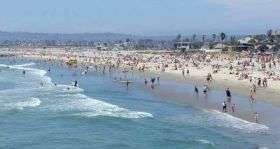Toward long-range beach forecasts on bacterial contamination

Long-range forecasts of beach bacterial contamination are inching closer to reality because of a new water quality prediction method scheduled for publication in the July 15 issue of the ACS' Environmental Science & Technology.
"For the first time, this study showed that bacteria concentrations could be forecasted with reasonable accuracy, hastening the day when people will be able to better plan their beach holidays," the report says.
In the new study, Walter E. Frick and colleagues explain that decisions on whether beaches are safe for swimming, or should be closed due to fecal contamination, are based on testing the water for E. coli.
However, existing tests take 24 hours to complete, providing a backward-only look at conditions the previous day. As a result, beaches may be closed unnecessarily when water quality has improved, or open when water quality has declined and disease-causing microorganisms are present.
Building on pioneering modeling studies in the Great Lakes by the U. S. Geological Survey (USGS) and others, the researchers developed "Virtual Beach," a broadly-applicable software tool for the development of models that predict concentrations of indicators of fecal contamination at beaches.
Unique features of Virtual Beach are the ability to evaluate a dynamic modeling approach for using short-term data sets to rapidly develop reliable models, and the use of available weather and marine forecast variables to forecast E. coli levels 24 hours or more in advance.
Evaluations of Virtual Beach were accomplished using data collected by USGS, NOAA and other sources for Huntington Beach on Lake Erie in northeastern Ohio. During the 42-day study, models developed by Virtual Beach correctly forecasted 24 hours in advance eight instances when E. coli levels exceeded safety standards. These results exceeded the accuracy of traditional sampling methods and approximately matched the accuracy of nowcasting (real-time predictions), according to the researchers.
Source: ACS



















